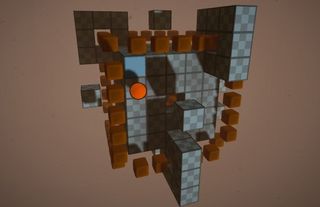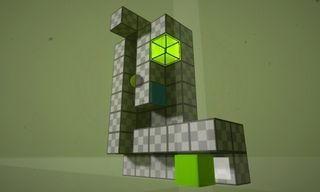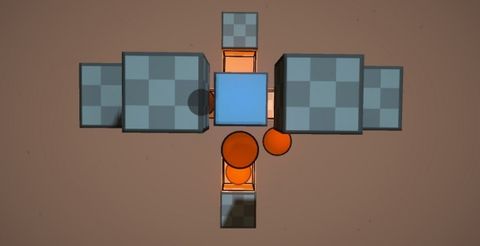Our Verdict
Stylish and obscure, this is a fascinating exploration of abstract puzzle design. No idea where the name comes from, though.
PC Gamer's got your back
There are times when English Country Tune feels like an entrance exam for MIT or Google, or a particularly selfimportant branch of Morrisons. I stare at the screen, and realise I have no idea what to do, let alone how I'm meant to do it. It's a game that isn't afraid to make you feel stupid.
You're a square of blue card travelling end over end across a series of blocky arenas, pushing objects around and getting into abstract scrapes. You can climb walls, and you can crawl down the back of a level and out the other side. The twist is that traversal is just the starting point for a game that rewrites its rules and objectives with each new batch of challenges you unlock.

While you're pushing blocks off ledges in Whale, you're leaving cubes in your wake in Planting, as your mission switches from sweeping up to covering every surface of a three-dimensional object without getting trapped.
It can make you feel giddy with joy when everything suddenly makes sense. Its challenges haunt you through the day, while its solutions come to you in the night, and you wake up happy. I'd forgotten that puzzles could work that way.
My favourite section is Advanced Cutting, in which you move over a series of spikes – each one punching a hole in your card so that you can match the template you need to unlock the exit. It's reverse-engineering at its most tactile; it's there, and then it's gone, and you're on to something completely different.

Advanced Cutting is one of the simpler ideas, however. A lot of the things that you're asked to do in English Country Tune exist in a terrifying realm of pure geometry, where spatial awareness is confounded by bizarre physics. In Larva, for example, you're tasked with prodding a series of spheres into ditches. Except the spheres borrow their understanding of gravity from the direction you push them in, meaning they may simply edge along the floor if you shove from behind, but they'll fall sideways off the screen if you shove from the side. There's an undo option, thankfully, letting you cancel your moves one by one, unstitching a series of increasingly catastrophic mistakes and detangling the mess of thought processes twizzled together in your brain. It's a blunt approach to handling difficulty, but it encourages you to learn while you fumble along.
And learning ultimately lies at the heart of English Country Tune. That shouldn't be too surprising: it's the work of indie developer Stephen Lavelle, a man who once wondered what Tetris would be like if you had to play it backwards, and then built a version that worked that way in order to find out. He's the sort of guy we need more of, in other words, and English Country Tune is the sort of puzzler we need more of, too. It's precise and devious. It's infuriating and endlessly open-minded.
Review by Chris Donlan.
Stylish and obscure, this is a fascinating exploration of abstract puzzle design. No idea where the name comes from, though.
Hey folks, beloved mascot Coconut Monkey here representing the collective PC Gamer editorial team, who worked together to write this article! PC Gamer is the global authority on PC games—starting in 1993 with the magazine, and then in 2010 with this website you're currently reading. We have writers across the US, UK and Australia, who you can read about here.


